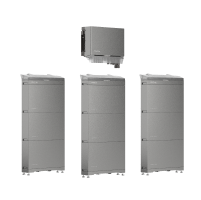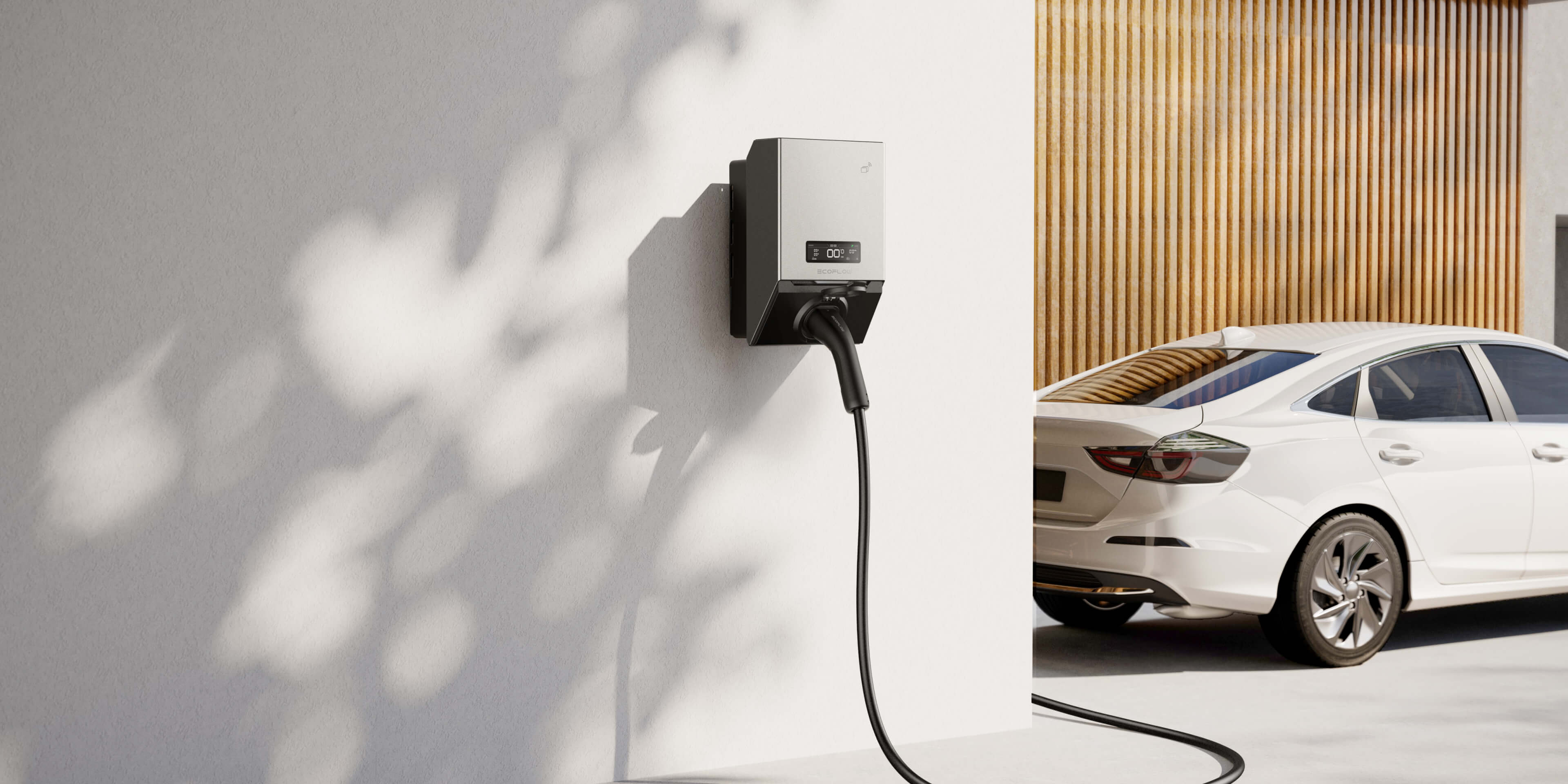EV Home Charger UK: How to Choose the Best Home Charger for EV Cars (2026)
If you’re planning to install an EV home charger in the UK, choose one that goes beyond simple top-ups. The best home EV charger UK options today combine efficiency, smart features, and long-term savings—serving as both a practical and future-proof investment. Here’s what you should know before buying.
What is an EV charger and how does it work?
At its core, a home charger for EV cars manages AC power from your home to your car, which the vehicle's onboard system then converts for battery storage.
A home charger's power is measured in kilowatts (kW); this determines its charging speed, such as how a typical 7.4kW unit that runs on the standard single-phase supply of a residential property adds about 30 miles of range per hour. This is ideal for cost-effective overnight charging, unlike powerful public chargers that often use a three-phase supply to deliver 50kW or more for rapid, non-optimised top-ups.
Choosing the right power rating for your EV home charger UK
In the UK, the most common domestic power rating options are 3.6kW, which adds about 15 miles of range per hour, and 7.4kW, which adds double at 30 miles per hour.
Both are suitable for overnight charging, but the latter is fast becoming the more ideal option for EV owners. Not only is it deemed more cost-effective, but it is also seen as the more future-proof option due to its capacity to cater to the increasing battery sizes.
There are the 11kW and 22kW units that can add 45 miles and 80 miles per hour, respectively, but they require a three-phase electrical supply, which is mostly used in commercial and industrial sites.
Rule of thumb: Know your car’s maximum AC charging speed from its onboard charger, then choose the fitting charger, because a charger cannot exceed the car's own limit.
EV charger connector types and compatibility
A variety of connector types exists—grouped under AC or DC charging—but Type 2 is the UK’s universal standard for home and public AC charging. The choice then lies between a charger that is fixed to your wall (a tethered unit) and an untethered charger that is much like your phone’s, which you simply bring out when you need some topping up.
While the former’s stationary nature provides utmost convenience, some people do not find it visually appealing. Meanwhile, the latter lessens the clutter and adds flexibility, but you have to use your own cable for every top-up.
Confirm that your car uses the standard Type 2 port by checking the label inside the vehicle's charging flap or consulting the owner's manual.
Smart features and tariff savings of home chargers for EV cars
It is not uncommon for an EV home charger in the UK to be connected to a smartphone app. The end goal: electricity savings, if done right. Use the app to schedule charging when the electricity tariff is cheapest, and to monitor your energy consumption so you can do appropriate charging optimisation.
A smart EV home charger is also capable of upholding safe and efficient energy distribution, particularly in a household with two or more electric vehicles through load-sharing technology: the system divides the available power between the vehicles instead of letting all charge at maximum speed simultaneously.
Installation and electrical considerations
Before getting an EV home charger in the UK, make sure your electrical system at home can handle one. During the installation itself, do employ the help of a qualified installer for proper safety checks and legal compliance.
Typically, a charger provider will send an installer to do the job—they will check your property, mount the charging unit (if tethered) near where you park your car, and run the unit’s cable to your electric panel. See to it that your installer actually does the needed safety checks in compliance with the UK's BS 7671 wiring standards and provides you with the Electrical Installation Certificate after.
Do note that it’s possible that some fuse boxes would be recommended for upgrade prior to installation due to any of the following instances: it's an older model, lacks spare capacity, or doesn't meet the current regulations needed for a high-power circuit.
EV home charger UK grants and eligibility (2026)
In a bid to encourage more people to switch to EVs and other eco-friendly vehicles, the UK government’s OZEV Electric Vehicle Chargepoint Grant helps make home charging more accessible. Some bases for qualifications:
- Must be a tenant (in any property type) or own and live in a flat
- Have dedicated off-street parking
- Own an eligible EV (government-approved list includes all fully battery-electric vehicles as well as specific plug-in hybrids (PHEVs) that are capable of a significant zero-emission range and have very low CO2 emissions
The grant provides a discount covering 75% of the cost to purchase and install a smart charger, up to a maximum saving of £350. You don't apply for the grant yourself; your chosen OZEV-authorised installer will handle the claim on your behalf and deduct the amount directly from your final bill.
What kind of product or solution are you interested in?


Optimal location and practical setup for EV chargers
Having an EV charger installed comes easily for people with off-street parking, like a driveway or garage. Consider a location where you normally park, plan out how you will store the charging cable to prevent any trip hazards, and verify that the height at which the unit is safe from bump incidents.
It might be a different story for those without a driveway, however. You can consider cross-pavement channels, but they are complex and require direct approval and engagement with your local council since regulations vary significantly by area.
Cost of the best home EV chargers in the UK
Public charging looks quite the catch versus going through the purchase process of a home charger. But when you think long-term, shelling out around £800 to £1,500 for your own EV home charger UK might just be a fair price for the convenience it offers. More so when you go for the smart kind.
Smart home EV charger affords the user the option to schedule charging sessions during the times when the electricity rates are low. When utilised properly, long-term savings on your energy bills can be substantial.
Future-proofing your home charger for EV cars setup: EcoFlow PowerPulse 2

Things change in a snap, so investing in EV chargers that are made to adapt to these changes can give you your money’s worth. One such is the EcoFlow PowerPulse 2, which has an open system that operates seamlessly with different energy providers, and the kind that makes it compatible even for future EVs.
It is even suited for vehicle-to-grid technology or bidirectional charging, allowing owners to use their car’s saved-up energy to power their home when needed. The EcoFlow Power Pulse2 also does not simply let you map out your charging times, but it also lets you identify your energy goals.
FAQ
What is the best EV home charger in the UK?
The best one depends on your needs. A smart EV home charger from a reputable brand offers the ideal balance of safety, flexibility, and future readiness.
How much does an EV home charger cost in the UK?
Expect to pay between £800 and £1,500 for a quality smart charger, installation fees included.
Are home chargers for EV cars worth it?
It could seem expensive upfront, but the convenience and cost savings compared to public charging make it an essential purchase for any EV owner.
How long will a home EV charger last?
A quality EV home charger should last for 10 years or more, with UK brands typically offering a 3-year warranty.
How much does an electrician charge to install an EV charger in the UK?
Installation costs are usually bundled with the charger purchase.
How long does a 7kW charger take to charge a car?
A 7.4kW charger adds about 30 miles of range for every hour of charging. This means a typical EV can be fully charged overnight.


